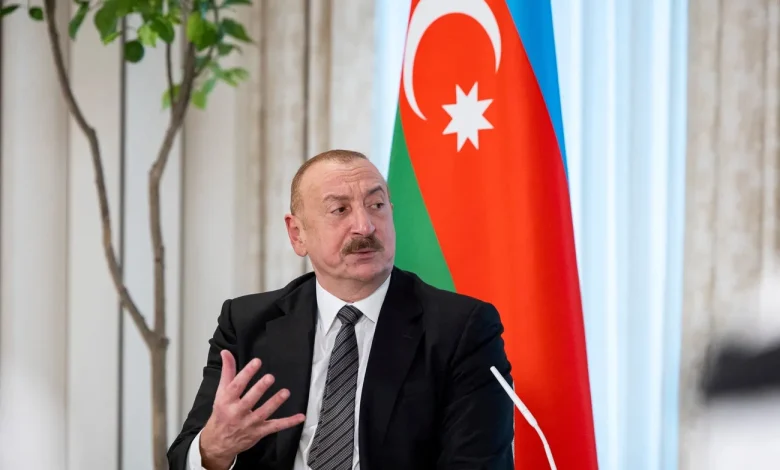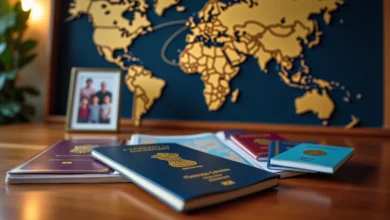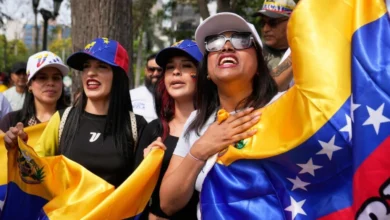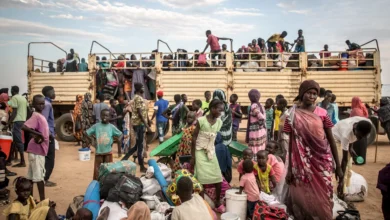
Azerbaijan Claims India Blocks SCO Membership Over Pakistan Ties
Azerbaijan faces a most important setback as the country claims India blocks its application to join the Shanghai Cooperation Organization. Several Azerbaijani media outlets report that India seeks “revenge” against Baku on global forums because of its close strategic ties with Pakistan. The situation grew tense after Azerbaijan’s President Ilham Aliyev met Pakistan’s Prime Minister Shehbaz Sharif at the SCO summit in Tianjin. During this meeting, he congratulated Pakistan on what he called a “victory” over India in a recent military clash.
China backed Azerbaijan’s application to the regional security bloc, but the membership bid failed because India opposed it. Azerbaijani media claims New Delhi violates the principles of “multilateral diplomacy” through its opposition [-5]. The Azerbaijan Society of America and other Azerbaijan societies haven’t commented on these diplomatic tensions yet. This development shows a transformation in regional alliances. Azerbaijan’s military spending and strategic collaborations now influence its international relations beyond the Caucasus region. Regional dynamics shape international relationships today, much like they did when Azerbaijan was part of the SSCB (Soviet Union).
Azerbaijan accuses India of blocking SCO membership
Diplomatic tensions erupted at the SCO Summit in Tianjin when Azerbaijan openly accused India of blocking its bid to become a full member of the Shanghai Cooperation Organization. This clash has revealed deeper geopolitical rifts between Pakistan, China, and their regional allies.
What did President Ilham Aliyev say at the summit?
President Ilham Aliyev met Pakistani Prime Minister Shehbaz Sharif at the SCO Summit and didn’t hold back his criticism of India. He claimed India wanted “revenge” against Azerbaijan because of its strong relationship with Pakistan. The Azerbaijani president went on to congratulate Pakistan on what he called its “victory over India” in recent military clashes. He made it clear that Azerbaijan would stick to its “brotherhood” with Islamabad, regardless of New Delhi’s actions in international organizations.
How did Azerbaijani media frame the accusation?
Azerbaijani news outlets spoke with one voice about India’s opposition. AnewZ, a pro-government broadcaster, reported that Indian officials had “once again” stopped Azerbaijan from becoming a full member. These media outlets said New Delhi had gone against the principles of “multilateral diplomacy” and the “Shanghai Spirit”. They argued that countries shouldn’t bring their two-way disputes into multilateral forums. The coverage linked India’s opposition directly to Azerbaijan’s support for Pakistan during Operation Sindoor after the April 22 Pahalgam attack.
What is the significance of the SCO membership bid?
Azerbaijan’s SCO membership bid plays a key role in its diplomatic push toward the East. The SCO, which started in 2001, now has ten full members: Russia, Belarus, India, Iran, Kazakhstan, Kyrgyzstan, China, Pakistan, Tajikistan, and Uzbekistan. Azerbaijan shares dialog partner status with 13 other countries.
Full membership would boost Azerbaijan’s position in Eurasian security and economic partnerships. China supports Azerbaijan’s application and says it fits with the organization’s principles. The rules require all members to agree on new additions, so India’s opposition effectively stops Azerbaijan from moving up from its current status.
India cites Azerbaijan-Pakistan ties as key concern
Image Source: Free Press Journal
New Delhi opposes Azerbaijan’s SCO membership bid because Baku shows steadfast dedication to Pakistan in regional conflicts. This diplomatic tension shows wider geopolitical issues that grew stronger throughout 2025.
How has Azerbaijan supported Pakistan in recent conflicts?
Azerbaijan shows solid support for Pakistan through diplomatic statements and beneficial alliances. Azerbaijani Foreign Minister Jeyhun Bayramov called Pakistani Deputy Prime Minister Muhammad Ishaq Dar in May 2025 to talk about rising tensions with India. Bayramov offered condolences for civilian deaths and restated Azerbaijan’s support for Pakistan. President Ilham Aliyev also congratulated Prime Minister Shehbaz Sharif on what he called Pakistan’s “victory” over India in their recent military clash. Baku’s support goes beyond the current crisis and has expanded defense, trade, and security cooperation with Islamabad over the last several years.
What role did Operation Sindoor play in escalating tensions?
Operation Sindoor pushed Azerbaijan-Pakistan ties to become India’s main concern. India launched Operation Sindoor on May 6-7 after the Pahalgam terror attack on April 22. The operation targeted terror bases in Pakistan and Pakistan-occupied Kashmir. Azerbaijan quickly released an official statement against India: “We condemn military attacks against…Pakistan that killed and injured several civilians. Being in solidarity with the people of Pakistan, we express condolences to families of the innocent victims”. Azerbaijan’s Embassy in Islamabad pledged full support for Pakistan against Indian actions.
How did India respond diplomatically and militarily?
India acted on two fronts – it blocked diplomatic progress and built military partnerships. New Delhi stopped Azerbaijan from getting full SCO membership, which needed all members to agree. India also deepened its defense ties with Armenia—Azerbaijan’s long-time rival. Military cooperation between India and Yerevan has grown since 2020, with increased arms sales. Experts see this growing relationship as a calculated move against what some sources call the “Turkey-Azerbaijan-Pakistan axis”. The Nagorno-Karabakh conflict adds more context to these changing alliances, and tensions remain high despite ceasefire deals.
China supports Azerbaijan as India stands firm
Image Source: Aze.Media
Chinese President Xi Jinping backs Azerbaijan’s SCO membership bid, which stands in contrast to India’s opposition.
What was China’s position at the SCO summit?
President Xi made it clear at the Tianjin summit that “China supports Azerbaijan in joining the Shanghai Cooperation Organization”. He called Aliyev “my dear friend” during their meetings and highlighted their strategic collaboration that has grown over three decades. The leaders signed several agreements that covered artificial intelligence, science and technology advances, finance, and media cooperation. Xi emphasized the need to improve the Trans-Caspian International Transport Corridor. He also wanted to expand cooperation in infrastructure, agriculture, and energy.
How does this reflect broader China-India rivalry?
Beijing’s support shows the ongoing strategic competition between China and India within the SCO framework. Modi and Xi talked about increasing bilateral trade at the summit. They claimed they are “development partners, not rivals”. However, their different stances on Azerbaijan’s membership reveal underlying tensions. India had refused to sign a joint statement at an SCO defense ministers meeting because it noticed a pro-Pakistan bias.
What is the new SCO Partner status and its implications?
The SCO has united its “Observer State” and “Dialog Partner” classifications into one “SCO Partner” status. Azerbaijan, which is currently a dialog partner with 13 other nations, will get this revised designation. This efficient structure wants to boost cooperative frameworks with more countries. However, it doesn’t match full membership, which needs all existing members to approve.
India strengthens Armenia ties amid regional shifts
Image Source: ETV Bharat
India has emerged as Armenia’s largest defense supplier, surpassing Russia in a strategic countermove to the Azerbaijan-Pakistan-Turkey alliance. Russian exports factored in 93.7% of Armenia’s arms imports from 2011 to 2020.
How has India expanded defense cooperation with Armenia?
Defense contracts between India and Armenia have multiplied since 2022. The agreements include Akash-1S surface-to-air missile systems, Pinaka multi-barrel rocket launchers, Swathi weapon-locating radars worth USD 146.88 million, and anti-drone systems. Current and upcoming contracts could range from USD 3.67 billion to USD 7.34 billion. Armenia has become the leading importer of advanced Indian military platforms.
What is the historical context of the Armenia-Azerbaijan conflict?
Nagorno-Karabakh stands at the heart of the Armenia-Azerbaijan conflict. The enclave’s ethnic Armenian population fled after Azerbaijan’s September 2023 offensive. The region was officially dissolved on January 1, 2024. Both countries signed a US-brokered peace agreement in August 2025.
How does this arrange with India’s South Caucasus strategy?
Armenia offers India a strategic foothold against the “Turkey-Azerbaijan-Pakistan axis”. The country’s position proves vital to develop alternative trade routes through the International North-South Transport Corridor.
What are the reactions from Azerbaijan and Turkey?
Azerbaijan’s deputy foreign minister Yalchin Rafiyev has asked India to “carefully approach” Azerbaijan-Armenia relations. Indian travelers have canceled their trips to Azerbaijan and Turkey, leading to a 60% drop in bookings.
The diplomatic tension between India and Azerbaijan over SCO membership shows deeper political conflicts between South Asia and the Caucasus region. Azerbaijan’s public accusations against India point to problems that go beyond just two countries and affect regional friendships. India’s move to block Azerbaijan’s full membership links directly to Baku’s strong support for Pakistan during recent military conflicts, especially Operation Sindoor.
China has stepped up as Azerbaijan’s main supporter in the SCO framework. This creates another layer in the already complex relationship between China and India. These moves reflect a bigger political game across Eurasia, where countries choose their friends based on what benefits them most.
India’s defense ties with Armenia have grown stronger as a calculated response to the Azerbaijan-Pakistan-Turkey alliance. India has become Armenia’s biggest arms supplier. This marks a big change in South Caucasus power balance, especially after Russia’s long-standing control over Armenian defense purchases.
What started as a simple membership issue now shows a complete reshaping of regional powers. The SCO was created to help countries work together, but it has become a place where countries fight out their differences. Azerbaijan’s new “SCO Partner” status, instead of full membership, shows these ongoing tensions.
This situation explains how old rivalries and modern alliances shape international organizations. Both sides say they support working together, but their actions show they care more about their own partnerships than unity within the organization. Regional powers keep adjusting their relationships, and this creates big problems for SCO’s ability to work as a security partnership.






